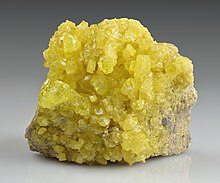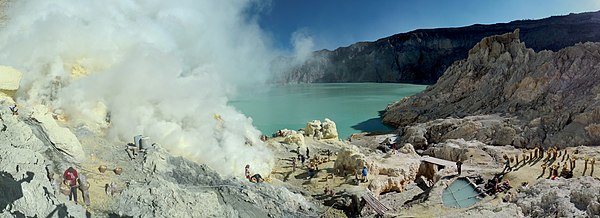Sulfur - Simple English Wikipedia, the free encyclopedia


Sulphur is a chemical element. The symbol for sulphur is S, and its atomic number is 16.
Properties
[change | change source]Sulphur is a yellow solid that is a nonmetal. It is fragile (easily broken) and crystalline. It burns easily, releasing toxic fumes of sulfur dioxide. It has a very faint odor. If it is melted and cooled very quickly, it makes a rubbery form of sulfur that is called "plastic sulfur". It gradually turns back into the yellow brittle form. It does not dissolve in water. The smell normally known as "sulfur" comes from hydrogen sulfide and similar chemicals. These sulfides are produced when things decay without air.
Chemical compounds
[change | change source]Sulfur compounds are chemical compounds containing sulfur ions. Sulfur comes in several forms: oxidation states of -2 (hydrogen sulfide), +4 (sulfur dioxide, sulfites) and +6 (sulfuric acid, sulfates) are most common, although there are other oxidation states.
Sulfur oxides
[change | change source]- Sulfur dioxide, colorless toxic heavy gas, used to preserve dried foods
- Sulfur trioxide, various forms, sometimes liquid, irritating and toxic
- Oleum, sulfur trioxide dissolved in sulfuric acid

Sulfur acids
[change | change source]Mixture of sulfur oxides and water
- Sulfurous acid, unstable, weak
- Sulfuric acid, stable, strong acid, most used chemical after water
- Hydrogen sulfate, an ion produced when sulfuric acid only loses one acidic proton
- Hydrogen sulfide, weak smelly gas, becomes acidic when dissolved in water
Sulfides
[change | change source]Salts of hydrogen sulfide
- Ammonium sulfide, used in stink bombs
- Antimony trisulfide, used in match heads
- Arsenic trisulfide, less toxic arsenic compound
- Barium sulfide, used to make barium from barium sulfate
- Bismuth(III) sulfide, bismuth ore
- Iron sulfide, found as pyrite naturally
- Lead(II) sulfide, found as galena naturally
- Selenium disulfide, used in hair treatment creams
- Potassium sulfide, reacts with water
- Silver sulfide, tarnish on silver objects
- Thallium(I) sulfide, infrared detector
- Tin(II) sulfide, dark brown solid
- Tin(IV) sulfide, gold solid, "mosaic gold"
- Zinc sulfide, used in fluorescent bulbs
Sulfites
[change | change source]Salts of sulfurous acid
- Sodium sulfite, used to preserve dried foods
- Potassium sulfite, used to preserve foods
Sulfates and bisulfates
[change | change source]Salts of sulfuric acid
- Alums, all of them
- Aluminium sulfate
- Ammonium sulfate, used in fertilizers
- Barium sulfate, used to take X-rays of digestive system
- Cobalt(II) sulfate, used in pigments
- Copper(II) sulfate, used to kill algae
- Chromium sulfate, used to make chrome alum
- Iron(II) sulfate, used for reduction
- Iron(III) sulfate, rare
- Lead(II) sulfate, white solid in lead acid batteries
- Manganese(II) sulfate, used to add manganese to soil
- Nickel(II) sulfate, used to make nickel compounds
- Sodium bisulfate, used in lowering pH
- Sodium sulfate, used in detergents and paper making
- Thallium(I) sulfate, colorless odorless tasteless highly toxic
- Tin(II) sulfate, used to make other tin compounds
- Zinc sulfate, used in pigments
Other sulfur compounds
[change | change source]- Sulfur(I) compounds
- Sulfur(I) chloride, yellow liquid
- Sulfur(II) compounds
- Sulfur(II) chloride, red odorous liquid
- Sulfur(III) compounds
- Disulfur dinitride, colorless solid
- Tetrasulfur tetranitride, orange solid
- Sulfur(IV) compounds
- Sulfur tetrafluoride, colorless toxic gas
- Sulfur(V) compounds
- Disulfur decafluoride, colorless toxic liquid
- Sulfur(VI) compounds
- Sulfur hexafluoride, colorless heavy gas
Occurrence and preparation
[change | change source]
Sulfur can be found in the earth near volcanoes. Many minerals contain sulfur ions. Coal contains sulfur ions which are released when it burns. Hydrogen sulfide and sulfur dioxide are some sulfur compounds that are released when coal burns. They are reacted to make sulfur. Sulfur in the ground in melted, then forced up through pipes by compressed (squeezed) air.
Uses
[change | change source]Sulfur is commonly used in gunpowder, medicine, and matches. Matches release sulfur dioxide when they burn, giving them their smell. Sulfur is an essential component to living cells. Many proteins contain sulfur. It is also used as a pesticide on organic farms.
Etymology
[change | change source]Powder sulfur is said to be left after an occurrence of a supernatural being.
Toxicity and safety
[change | change source]Sulfur is not toxic, but the chemical compounds formed when sulfur burns can be very toxic. Sulfuric acid, for example, can make paper turn black!
History
[change | change source]The ancient name for sulfur is brimstone. Sulfur was used in fumigation (making fumes) and medicine in ancient Greece. In 1777, Antoine Lavosier convinced the scientific community that sulfur was an element.
In July 2024, NASA's Curiosity rover found pure sulfur on the planet Mars.[1]
Related pages
[change | change source]References
[change | change source]Other websites
[change | change source]| H | He | ||||||||||||||||||||||||||||||||||||||||
| Li | Be | B | C | N | O | F | Ne | ||||||||||||||||||||||||||||||||||
| Na | Mg | Al | Si | P | S | Cl | Ar | ||||||||||||||||||||||||||||||||||
| K | Ca | Sc | Ti | V | Cr | Mn | Fe | Co | Ni | Cu | Zn | Ga | Ge | As | Se | Br | Kr | ||||||||||||||||||||||||
| Rb | Sr | Y | Zr | Nb | Mo | Tc | Ru | Rh | Pd | Ag | Cd | In | Sn | Sb | Te | I | Xe | ||||||||||||||||||||||||
| Cs | Ba | La | Ce | Pr | Nd | Pm | Sm | Eu | Gd | Tb | Dy | Ho | Er | Tm | Yb | Lu | Hf | Ta | W | Re | Os | Ir | Pt | Au | Hg | Tl | Pb | Bi | Po | At | Rn | ||||||||||
| Fr | Ra | Ac | Th | Pa | U | Np | Pu | Am | Cm | Bk | Cf | Es | Fm | Md | No | Lr | Rf | Db | Sg | Bh | Hs | Mt | Ds | Rg | Cn | Nh | Fl | Mc | Lv | Ts | Og | ||||||||||
| |||||||||||||||||||||||||||||||||||||||||


 French
French Deutsch
Deutsch